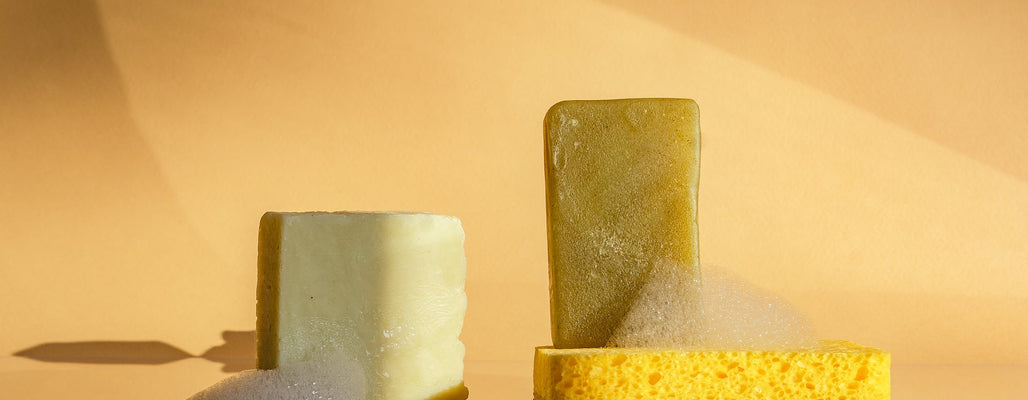
Today, consumers can choose from a diverse range of skin cleansers, but they generally fall into two types: soap-based and synthetic detergents or syndets. People have used traditional soap since ancient times, so it's undoubtedly the oldest surfactant and skin cleanser. On the other hand, syndet soap is much more recent and has been used for about a century.
Syndet Vs Soap: Similarities and Differences
Both soap- and syndet-based cleansers contain at least one surfactant (a surface active agent that is amphiphilic and has polar and non-polar properties). Due to surfactants' unique chemistry and characteristics, both soap- and syndet-based cleansers help lift the dirt away from the skin so it can be easier washed away with water.
But while soaps and syndets are similar in that, they cleanse dirt and impurities from the skin's surface, if we compare syndet vs soap, we'll notice significant differences between these two types of cleansers in composition, structure, uses, and properties.
The major difference between soap and synthetic detergent is that soap is made from natural ingredients such as vegetable oils and animal fats, and syndet is made from synthetic sources, such as petroleum fractions.
Today, soap is a basic personal hygiene product used for daily cleansing. Thanks to its amphiphilic structure, soap also can interact with the lipid membranes of microorganisms, such as viruses and bacteria, and inactivate them.
When making regular soap, fats or oils from animal or vegetable sources are degraded into free fatty acids, which combine with alkali, such as lye. The reaction is called saponification, and the result is alkali salts of fatty acids—emulsifying and foaming substances, which determine the product's detergent properties.
Commercially produced soaps may also contain added chemicals, such as artificial colorants and fragrances. Commercial soap manufacturers also often remove the natural glycerin and add synthetic ingredients not found in natural soap, like chemical preservatives to increase shelf life.
At Botanie Soap, we never add chemicals and use only natural ingredients, such as vegetable oils, essential oils, and plant extracts to make traditional cold-process soap for private-label use. Our soap bars and liquid soaps are perfect for skin care and friendly to the environment.
Although some syndet cleansers are marketed as "soap," they do not meet the FDA's definition of the term and are regulated as cosmetic. Syndets contain synthetic surfactants chemically synthesized from fats, petroleum/petrochemicals, or oil-based products (oleochemicals) and an alkali. Manufacturers use a combination of chemical processes, such as sulfonation, ethoxylation, alkylation, and esterification.
The history of synthetic detergents began only in 1916. They were first produced in Germany because of the shortage of animal fats caused by World War I as a substitute for fat-based soap to meet the demand for cleaning products. After World War II, their development gradually gained major importance in personal hygiene and laundry products. By the 1950s, syndets had developed into sophisticated products, overtaking traditional soap products in the US and Europe. Currently, syndets account for 60% of the global production of surfactants.
Is Syndet Body Wash Better Than Traditional Soap?
Syndet soap manufacturers claim their products are better for skin care because they are pH-balanced—neutral to slightly acidic (5.5 – 7.0), while true soap is alkaline (8.5 – 10.0). But the truth is that the pH of soap doesn't directly relate to how harsh or gentle a specific cleansing product is.
Remember that pH-balanced syndet body wash is still a cleansing agent designed to remove the oily layer that holds dirt on your skin. Natural skin oils (sebum) are an important component of the acid mantle that protects the skin. Besides, synthetic surfactants, such as Sodium Lauryl Sulfate (SLS) and Sodium Laureth Sulfate (SLES), that are common in syndets, may leave your skin dry and irritated and can even cause allergies and skin inflammation.
At the same time, properly formulated all-natural soaps and body washes like those we make at Botanie Soap don't contain harsh chemicals that may irritate your skin. Instead, they contain retained glycerin, a natural humectant with moisturizing properties. We use only certified organic plant-based and essential oils and never use artificial substances that may add to potential health or environmental risks.
With a trend toward more organic and green products, personal care products made from natural ingredients are growing in popularity among environmentally conscious consumers, so selling all-natural soap can be profitable. If you are interested in wholesale private-label soap, you can order our wholesale soap sample set with free delivery to see what we offer and choose products you could sell under your brand.
What Is Syndet Shampoo Bar?
These solid cleansing bars are specifically formulated to clean hair and scalp. Syndet shampoo bars contain the same ingredients—synthetic surfactants used to make commercial liquid shampoo, just without the water or plastic bottle. That's why they appeal to many consumers who care about the environment and want to adopt a more sustainable beauty routine and go plastic-free.
The best shampoo bars are made with natural ingredients and contain gentle plant-derived surfactants like Sodium Cocoyl Isethionate (SCI) and fatty alcohols, such as stearyl, cetearyl, or cetyl alcohol, that have hydrating properties and soften the skin.



